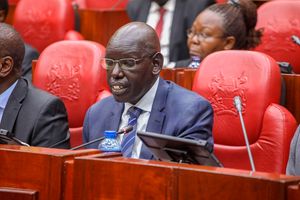
The Controller of Budget Margaret Nyakang'o.
The National Treasury is considering tightening the withdrawal of billions of shillings collected by public entities through the e-citizen by bringing the money under the purview of the Controller of Budget (CoB).
This would force public entities to seek approval from CoB Margaret Nyakang'o to access money paid to them for service delivery, a move the Treasury believes will curb the misuse of public funds.
A Treasury official told the Nation that while the government has introduced a single pay bill (222222) for all payments to public services to improve oversight of inflows and outflows, more controls are still needed before funds are spent.
“On critical review, it would be very necessary to bring the above funds under the purview of the COB to enhance oversight during withdrawals, rather than waiting for the annual audits,” said Mr Bernard Ndung’u, Treasury’s Director-General of accounting services.
The government has added more than 22,000 public services to the e-citizen, the single platform where Kenyans must log in to access various services, following a drive that began in 2023 and required all public entities to close all accounts they used to receive payments.
Since then, Kenyans seeking public services such as hospital treatment, applying for IDs, driving licences and passports have been required to pay for the services through a single bill as the relevant accounts of the entities are credited.
As the number of services uploaded to e-citizen has increased, the reporting of revenue generated by public institutions has skyrocketed, suggesting that much of the money was being stolen.
In the year to June 2024, Sh100.8 billion was collected through e-citizen as 120,000 transactions were processed daily, Treasury Cabinet Secretary John Mbadi previously said.
E-citizen management says that revenue generated through the platform is between Sh700 million and Sh1 billion daily.
However, the National Treasury is uncomfortable with the money flowing outside the government's official account for public funds, the Consolidated Fund (CF), and has taken steps to tighten controls around it.
“As we speak, there are concerns with accountability, reporting, and oversight of funds received and spent outside the CF in terms of AIA (appropriations-in-aid), as the funds are solely under management of the individual entities,” Mr Ndung’u said.
Noting that the gap led to the Treasury's push to channel all AIA collections by public entities through the single paybill, the official said the Treasury still believes that bringing the Controller of Budget on board would help to further tighten controls.
He said operations outside the Controller of Budget compromise accountability and oversight of the use of public funds.
The push to add controls to funds flowing through the e-Citizen would require entities to disclose the purposes for which they withdraw money and follow up on whether they end up spending the money as stated and in line with their approved budgets, as is the case with the CF.











